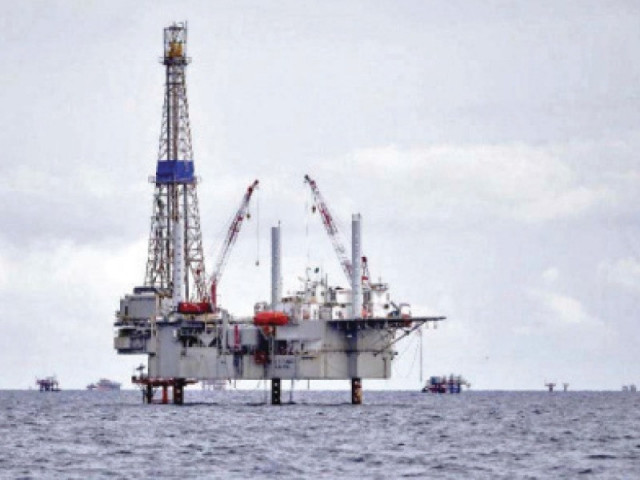Govt weighs offshore drilling reform
Dar-led committee mulls tax holidays, security measures to woo investors

The government is actively exploring two options to amend the offshore fiscal regime, aiming to revitalise interest in offshore drilling through tax holidays and strategic investment from friendly nations.
Previously, Pakistan attempted offshore drilling in collaboration with US energy giant ExxonMobil, following a nine-year hiatus. However, the venture was unsuccessful, with conspiracy theories blaming ExxonMobil for a lack of commitment to drilling in Karachi's offshore waters. Sources reveal that ExxonMobil had requested a larger exploration area in Karachi's sea, but security concerns prevented the government from granting the request.
Now, the Shehbaz-led government is formulating a new plan to attract investment from friendly countries, such as the United Arab Emirates (UAE), to reignite offshore drilling efforts in Pakistan.
Sources indicate that a high-level committee, chaired by Foreign Minister Ishaq Dar, has directed the Petroleum Division to finalise consultations with the exploration and production (E&P) industry regarding proposed amendments to the offshore fiscal regime. The Petroleum Division has been given 30 days to present its recommendations to the committee. In parallel, the division will engage in government-to-government negotiations with friendly countries to bolster these efforts.
Once the proposed amendments are approved, they will be incorporated into the talking points for the deputy prime minister's international engagements, aiming to advance economic diplomacy.
The committee, led by Dar, is currently evaluating two main options. The first option is to proceed with offshore bidding under the existing regime or revise commercial terms before offering new bids. The Petroleum Division will hold a consultative session with the industry to determine the best way forward. However, sources caution that any revisions to the terms could cause delays, and without such revisions, the bidding round may not meet expectations.
The second option centres on reducing the government's stake in the offshore drilling process, or alternatively, maintaining the government's involvement. This option also considers whether to retain or abolish royalties, and whether to offer tax holidays for a specific period.
Regardless of the option selected, local E&P companies like OGDCL, PPL, and MPCL are expected to participate in the next round of offshore drilling in Pakistan.
In a recent meeting, the deputy prime minister considered various options to improve Pakistan's oil and gas sectors. The meeting, which included private and public sector representatives, aimed to address the challenges faced by the petroleum sector's E&P companies. Attendees included the ministers for petroleum, finance & revenue, and power, as well as heads of various E&P companies and Secretaries of relevant ministries.
The Petroleum Division briefed the committee on several issues, including circular debt, integrated energy planning, ease of doing business, offshore and onshore fiscal regimes, the implementation of recent amendments to the Petroleum Policy 2012, and current LNG imports.
After thorough discussions, the committee reached several key decisions. The Petroleum and Power Divisions were tasked with jointly developing an Integrated Energy Plan with the help of international consultants, aiming to complete the project by December 2024. The Petroleum Division was also directed to propose amendments to the OGRA Ordinance, introducing a mechanism for gas tariff adjustments on a monthly or quarterly basis to prevent the further accumulation of circular debt in the gas sector.
Additionally, the Petroleum and Power Divisions will reassess the plan for settling circular debt through cash or non-cash adjustments to cleanse balance sheets. The final plan will be presented at the next committee meeting in two weeks. The divisions will also evaluate the shared use of gas from dedicated fields to optimise resource utilisation.
The Petroleum Division has been tasked with developing a restructuring plan for the Sui companies, transitioning from an asset-based fixed return regime. Meanwhile, the Interior Division will collaborate with E&P companies and stakeholders to establish the best security mechanisms for exploration activities. To streamline operations, the Interior Division will introduce a one-window facilitation system at both federal and provincial levels, ensuring security in challenging areas, and associated security costs will be rationalised in consultation with relevant departments.
Finally, the Petroleum Division will focus on digitising processes within the Directorate General of Petroleum Concessions, presenting a detailed plan and strategy within the next 45 days. The division will also work to streamline regulatory approvals and enhance the ease of doing business through process automation and digitalisation at all levels.


1733130350-0/Untitled-design-(76)1733130350-0-208x130.webp)















COMMENTS
Comments are moderated and generally will be posted if they are on-topic and not abusive.
For more information, please see our Comments FAQ